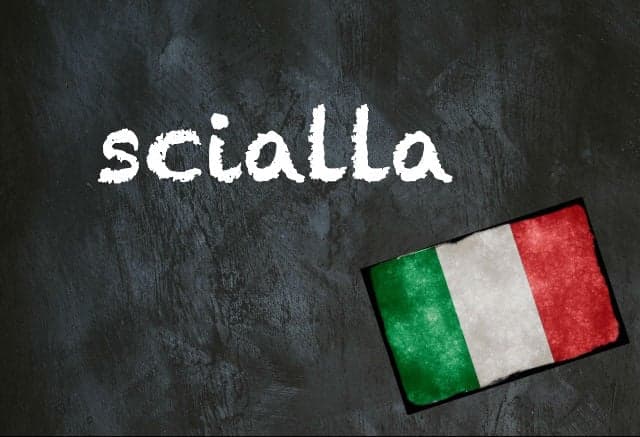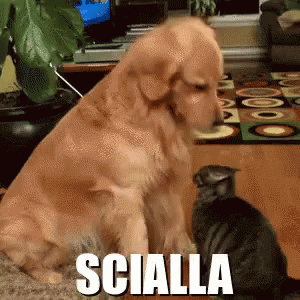Italian word of the day: 'Scialla'

No stress: this word is easier than it looks.
Hearing this word – pronounced "shal-la" – you'd be forgiven for wondering if the Italians around you were speaking their own language.
It sounds distinctly like the Arabic expressions "inshallah" ('God willing') and "mashallah" ('God willed it') – and indeed, that's probably at least one of the influences that has contributed to scialla becoming popular slang in recent years, especially among young Italians.
As the ragazzi say, it means 'relax', 'calm down' or 'chill out' – usually as an instruction to someone else.
Scialla, il prof ha detto che va bene.
Relax, the teacher said it was ok.
But you can also use it as an adjective to describe a person or situation as 'relaxed', 'easygoing' or 'chill'. (Remember you'll need to change the final vowel depending on whether you're referring to a feminine or masculine subject.)
Stare sciallo, fratello.
Be chill, man.
Se non fosse abbastanza chiaro, non sono scialla.
If it wasn't clear already, I am not chill.
Scialla has been around for several years, but it truly penetrated the mainstream Italian consciousness – at least the part of it that's over 40 – when it was the title of a successful comedy film in 2011 (released in English as 'Easy'). Although, in a sign of how relatively new the word still was, the movie bore the subtitle "Stai sereno" ('Don't worry') in case the meaning passed older Italians by.
Indeed the word stands for the generation gap between the young protagonist and his estranged father, not only in their vocabulary but their whole attitude to life: the father uptight, his son happy-go-lucky.

The film's director, Francesco Bruni, said he chose the title after hearing his teenage children use the word constantly. "It's a concise expression that fits in easily," he told one interviewer. "For those who understand it, it feels like a password, and those who don't are intrigued by it."
Like with all slang words, the origins of scialla are hard to pin down. But they may be closer to home than it sounds: according to the Accademia della Crusca, the official guardians of the Italian language, it might come from the central-southern Italian verb scialare ('to have fun' or 'live it up'), which has been in use since at least the 19th century and in turn probably derives from the Latin verb exhalare, 'to breathe out' or 'let go'.
Alternatively, it could be Tuscan for 'pant' or 'wheeze' – the idea being that telling someone to 'breath heavily' (or deeply) is code for saying they need to calm down.
Yet another explanation says that scialla was the phrase shouted by Ligurian sailors upon their safe return from sea: the equivalent of 'hooray' and a celebration of life, as precarious as it is. Apparently some mothers even whispered it to their children as a charm to reassure them that their father would be back.
.
Did those sailors pick up scialla from across the Mediterranean? Quite possibly. Whatever its roots, the mix all adds to the word's appeal today. Don't take it from from me: even the word nerds at the Crusca call scialla "one of the most loveable" linguistic trends
"It's clear, slips easily into speech, has a flavour of dialect (for many, the Roman dialect) and brings with it the calm of the Mediterranean, perhaps an air of Arabic," the venerable academy declares – displaying an attitude to language evolution that is, quite frankly, scialla.
Do you have a favourite Italian word you'd like us to feature? If so, please email us with your suggestion.
Comments
See Also
Hearing this word – pronounced "shal-la" – you'd be forgiven for wondering if the Italians around you were speaking their own language.
It sounds distinctly like the Arabic expressions "inshallah" ('God willing') and "mashallah" ('God willed it') – and indeed, that's probably at least one of the influences that has contributed to scialla becoming popular slang in recent years, especially among young Italians.
As the ragazzi say, it means 'relax', 'calm down' or 'chill out' – usually as an instruction to someone else.
Scialla, il prof ha detto che va bene.
Relax, the teacher said it was ok.
But you can also use it as an adjective to describe a person or situation as 'relaxed', 'easygoing' or 'chill'. (Remember you'll need to change the final vowel depending on whether you're referring to a feminine or masculine subject.)
Stare sciallo, fratello.
Be chill, man.
Se non fosse abbastanza chiaro, non sono scialla.
If it wasn't clear already, I am not chill.
Scialla has been around for several years, but it truly penetrated the mainstream Italian consciousness – at least the part of it that's over 40 – when it was the title of a successful comedy film in 2011 (released in English as 'Easy'). Although, in a sign of how relatively new the word still was, the movie bore the subtitle "Stai sereno" ('Don't worry') in case the meaning passed older Italians by.
Indeed the word stands for the generation gap between the young protagonist and his estranged father, not only in their vocabulary but their whole attitude to life: the father uptight, his son happy-go-lucky.

The film's director, Francesco Bruni, said he chose the title after hearing his teenage children use the word constantly. "It's a concise expression that fits in easily," he told one interviewer. "For those who understand it, it feels like a password, and those who don't are intrigued by it."
Like with all slang words, the origins of scialla are hard to pin down. But they may be closer to home than it sounds: according to the Accademia della Crusca, the official guardians of the Italian language, it might come from the central-southern Italian verb scialare ('to have fun' or 'live it up'), which has been in use since at least the 19th century and in turn probably derives from the Latin verb exhalare, 'to breathe out' or 'let go'.
Alternatively, it could be Tuscan for 'pant' or 'wheeze' – the idea being that telling someone to 'breath heavily' (or deeply) is code for saying they need to calm down.
Yet another explanation says that scialla was the phrase shouted by Ligurian sailors upon their safe return from sea: the equivalent of 'hooray' and a celebration of life, as precarious as it is. Apparently some mothers even whispered it to their children as a charm to reassure them that their father would be back.
.
Did those sailors pick up scialla from across the Mediterranean? Quite possibly. Whatever its roots, the mix all adds to the word's appeal today. Don't take it from from me: even the word nerds at the Crusca call scialla "one of the most loveable" linguistic trends
"It's clear, slips easily into speech, has a flavour of dialect (for many, the Roman dialect) and brings with it the calm of the Mediterranean, perhaps an air of Arabic," the venerable academy declares – displaying an attitude to language evolution that is, quite frankly, scialla.
Do you have a favourite Italian word you'd like us to feature? If so, please email us with your suggestion.

Join the conversation in our comments section below. Share your own views and experience and if you have a question or suggestion for our journalists then email us at [email protected].
Please keep comments civil, constructive and on topic – and make sure to read our terms of use before getting involved.
Please log in here to leave a comment.